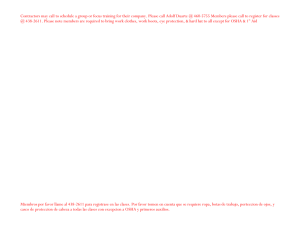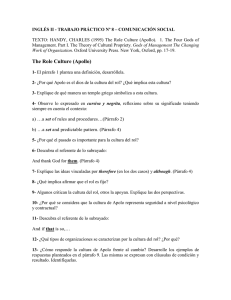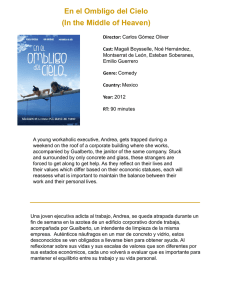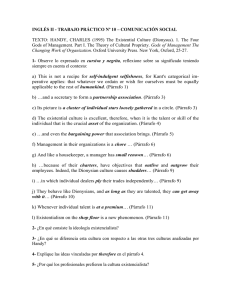The Task Culture (Athena)
Anuncio
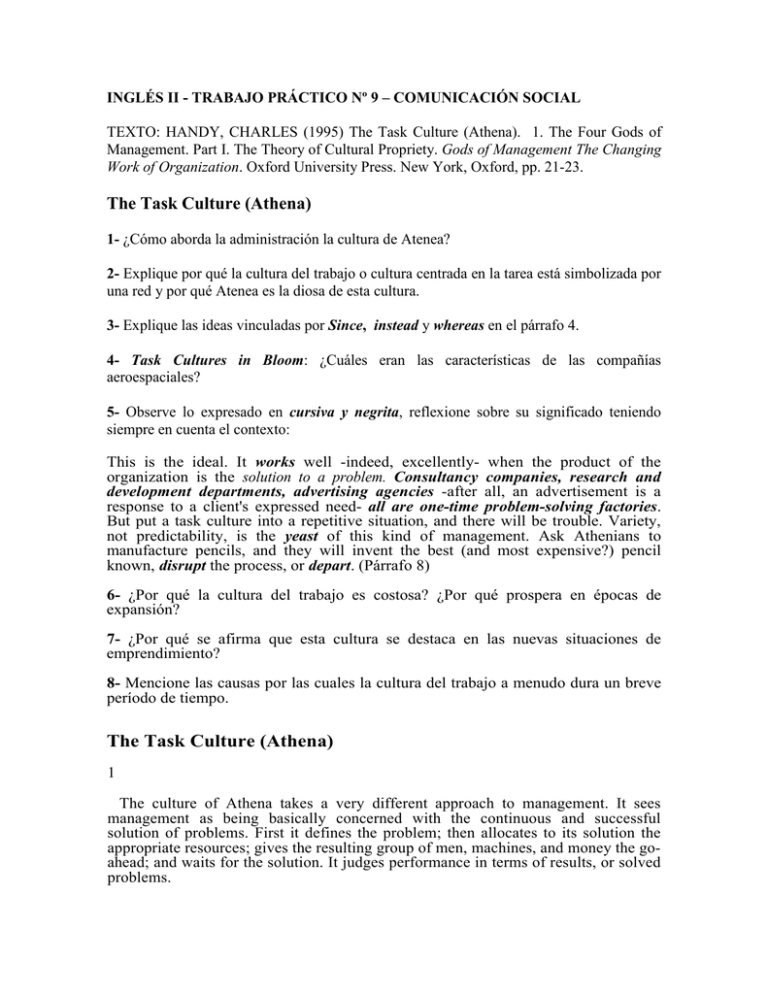
INGLÉS II - TRABAJO PRÁCTICO Nº 9 – COMUNICACIÓN SOCIAL TEXTO: HANDY, CHARLES (1995) The Task Culture (Athena). 1. The Four Gods of Management. Part I. The Theory of Cultural Propriety. Gods of Management The Changing Work of Organization. Oxford University Press. New York, Oxford, pp. 21-23. The Task Culture (Athena) 1- ¿Cómo aborda la administración la cultura de Atenea? 2- Explique por qué la cultura del trabajo o cultura centrada en la tarea está simbolizada por una red y por qué Atenea es la diosa de esta cultura. 3- Explique las ideas vinculadas por Since, instead y whereas en el párrafo 4. 4- Task Cultures in Bloom: ¿Cuáles eran las características de las compañías aeroespaciales? 5- Observe lo expresado en cursiva y negrita, reflexione sobre su significado teniendo siempre en cuenta el contexto: This is the ideal. It works well -indeed, excellently- when the product of the organization is the solution to a problem. Consultancy companies, research and development departments, advertising agencies -after all, an advertisement is a response to a client's expressed need- all are one-time problem-solving factories. But put a task culture into a repetitive situation, and there will be trouble. Variety, not predictability, is the yeast of this kind of management. Ask Athenians to manufacture pencils, and they will invent the best (and most expensive?) pencil known, disrupt the process, or depart. (Párrafo 8) 6- ¿Por qué la cultura del trabajo es costosa? ¿Por qué prospera en épocas de expansión? 7- ¿Por qué se afirma que esta cultura se destaca en las nuevas situaciones de emprendimiento? 8- Mencione las causas por las cuales la cultura del trabajo a menudo dura un breve período de tiempo. The Task Culture (Athena) 1 The culture of Athena takes a very different approach to management. It sees management as being basically concerned with the continuous and successful solution of problems. First it defines the problem; then allocates to its solution the appropriate resources; gives the resulting group of men, machines, and money the goahead; and waits for the solution. It judges performance in terms of results, or solved problems. 2 The symbol of the task culture is a net because it draws resources from various parts of the organizational system in order to focus them on a particular knot or problem. Power lies at the interstices of the net, not at the top, as in the Apollo culture, or at the center, as in Zeus organizations. Rather, the Athena organization is a network of loosely linked commando units, each unit being largely self-contained but having a specific responsibility within an overall strategy. 3 Its god (or goddess) is a young woman, Athena, the warrior goddess, patroness of Odysseus, arch problem solver of craftsmen and pioneering captains. The culture recognizes only expertise as the base of power or influence. Not age, length of service, or closeness of kin to the owner impresses. To contribute to your group, you need talent, creativity, a fresh approach, and new intuitions. It is a culture in which youth flourishes and creativity is at a premium. The youth, energy, and creativity associated with Athena fit the task culture quite well. 4 It is a good culture to work in if you know your job. Since the group has a common purpose (the solution of a problem), there is a sense of enthusiasm and joint commitment, with few of the private agenda conflicts that beset the first two cultures. Leadership in a common-purpose group is seldom a hot issue; instead, there is usually mutual respect, a minimum of procedural niceties, and a desire to help rather than exploit when others get into difficulties. It is a purposeful commando. It talks of teams, whereas a role culture has committees. Task Cultures in Bloom 5 A friend, employed as an executive with a venerable and traditional British heavy engineering company, went on a working visit to one of the aerospace companies of Southern California, toward the end of the 1960s, when the space race was at its height and the U.S. Defense Department was the world's largest customer, commissioning a long succession of solutions to high-technology problems, often on a cost-plus basis. 6 Although he did not know it, the aerospace companies at that time were the epitome of the successful task culture. Often as many as 30 percent of their managers had Ph.Ds. Their formal organizational structures were of the matrix type. They worked in project groups that were continually being dismantled and reassembled. They were at that time financially ebullient. 7 My friend returned to Britain with his eyes gleaming. "It was extraordinary," he said. "In those companies, not only did the sun shine all day outside, but the managers were young, intelligent, earning high salaries, and having fun, and the organization made money. In my company," he said ruefully, "we believe that these things are incompatible." 8 This is the ideal. It works well -indeed, excellently- when the product of the organization is the solution to a problem. Consultancy companies, research and development departments, advertising agencies -after all, an advertisement is a response to a client's expressed need- all are one-time problem-solving factories. But put a task culture into a repetitive situation, and there will be trouble. Variety, not predictability, is the yeast of this kind of management. Ask Athenians to manufacture pencils, and they will invent the best (and most expensive?) pencil known, disrupt the process, or depart. 9 Task cultures are expensive. They are staffed by experts who can demand their market price. They talk together a lot, and talking costs money. Problems are not always solved just right the first time, so there is the necessity for experimentation and the inevitability of errors. Errors cost money, even if they are speedily corrected. Expensive task cultures, therefore, tend to flourish in times of expansion, when the products, technologies, or services are new or when there is some sort of cartel arrangement that provides a price floor. In times of expansion you can get away with high prices -there is more than enough cake to go around. Similarly, new technologies or new products create, for a time, a sort of monopoly situation that lasts until the technology settles down or competitors arrive. During this monopoly situation, the costs or the task structure can be covered by higher charges and prices. In short, task cultures work well when one is venturing into new situations. Luckily, it is in those situations that success is rewarded with the money to pay for it. 10 Come hard times, however, or an end to venturing, or the need to make the solutions permanent or routine, and the task culture will seem unduly expensive. These cultures are not for plateaus. Athena did not care for domesticity and the routine chores of housekeeping. So task cultures often have a short life. If they are too successful, they will grow big and, to pay their way will take on a lot of routine or maintenance work, which requires Apollonian cultures. Failure, however, is one problem they find it hard to solve (it is hard for a cooperative group to dismiss half its members), and in hard times a Zeus usually emerges to deal with the crisis. Or the members may just grow older and want more routine or more personal power.
